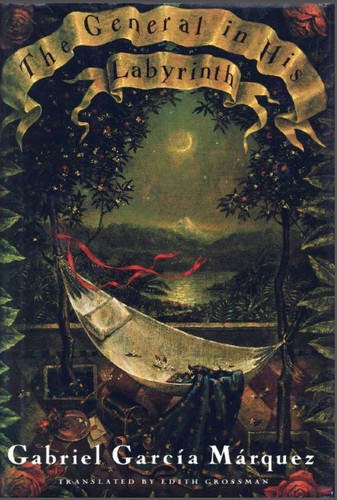Published Jan. 8, 1990 by Knopf.
The General in His Labyrinth
The General in His Labyrinth (original Spanish title: El general en su laberinto) is a 1989 dictator novel by Colombian writer and Nobel laureate Gabriel García Márquez. It is a fictionalized account of the last seven months of Simón Bolívar, liberator and leader of Gran Colombia. The book traces Bolívar's final journey from Bogotá to the Caribbean coastline of Colombia in his attempt to leave South America for exile in Europe. Breaking with the traditional heroic portrayal of Bolívar El Libertador, García Márquez depicts a pathetic protagonist, a prematurely aged man who is physically ill and mentally exhausted. The story explores the labyrinth of Bolívar's life through the narrative of his memories, in which "despair, sickness, and death inevitably win out over love, health, and life".Following the success of One Hundred Years of Solitude (1967) and Love in the Time of Cholera (1985), García Márquez decided to write about the …
The General in His Labyrinth (original Spanish title: El general en su laberinto) is a 1989 dictator novel by Colombian writer and Nobel laureate Gabriel García Márquez. It is a fictionalized account of the last seven months of Simón Bolívar, liberator and leader of Gran Colombia. The book traces Bolívar's final journey from Bogotá to the Caribbean coastline of Colombia in his attempt to leave South America for exile in Europe. Breaking with the traditional heroic portrayal of Bolívar El Libertador, García Márquez depicts a pathetic protagonist, a prematurely aged man who is physically ill and mentally exhausted. The story explores the labyrinth of Bolívar's life through the narrative of his memories, in which "despair, sickness, and death inevitably win out over love, health, and life".Following the success of One Hundred Years of Solitude (1967) and Love in the Time of Cholera (1985), García Márquez decided to write about the "Great Liberator" after reading an unfinished novel by his friend Álvaro Mutis. He borrowed the setting—Bolívar's voyage down the Magdalena River in 1830—from Mutis. García Márquez spent two years researching the subject, encompassing the extensive memoirs of Bolívar's Irish aide-de-camp, Daniel Florencio O'Leary, as well as numerous other historical documents and consultations with academics. Its mixture of genres makes The General in His Labyrinth difficult to classify, and commentators disagree over where it lies on the scale between novel and historical account. García Márquez's insertion of interpretive and fictionalized elements—some dealing with Bolívar's most intimate moments—initially caused outrage in parts of Latin America. Many prominent Latin American figures believed that the novel portrayed a negative image to the outside world of one of the region's most important historic figures. Others saw The General in His Labyrinth as a tonic for Latin American culture and a challenge to the region to deal with its problems.
